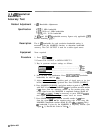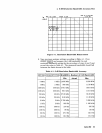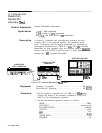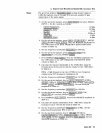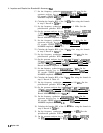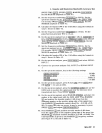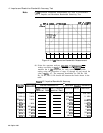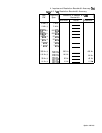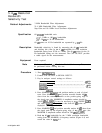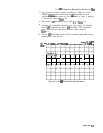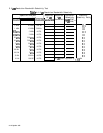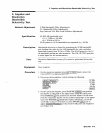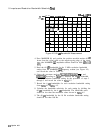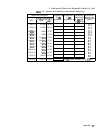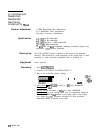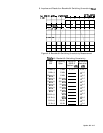
5. 6
dB
Resolution
Bandwidth
Selectivity Test
Related Adjustments
Specification
Description
Equipment
Note
Procedure
3 MHz Bandwidth Filter Adjustments
21.4 MHz Bandwidth Filter Adjustments
Step Gain and 18.4 MHz Local Oscillator Adjustments
60
dB/6
dB
bandwidth ratio:
~11:
1, 3
MHz
to 100 kHz bandwidths
~8: 1, 30
kHz to 30 Hz bandwidths
60
dB
points on 10 Hz bandwidth are separated by ~100 Hz
Bandwidth selectivity is found by measuring the 60
dB
bandwidth
and dividing this value by the 6
dB
bandwidth for each resolution
bandwidth setting from 30 Hz to 3 MHz. The 60
dB
points for the 10
Hz bandwidth setting are also measured. The CAL OUTPUT provides
a stable signal for the measurements.
None required
Performance Test 4, 6
dB
Resolution Bandwidth Accuracy Test, must
be performed before starting this test.
1. Press [INSTR PRESET).
2. Connect CAL OUTPUT to SIGNAL INPUT 2.
3. Key in analyzer control settings as follows:
[CENTER FREQUENCY)
......................................
.20
MHz
FREQUENCY SPAN]
&?Ti,
.........................................
20 MHz
...................................................
.3
MHz
@iEEDiJ
.................................................
100 Hz
SWEEP
@iiYZ-
4. Press MARKER
C-1
and position marker at peak of signal
trace. Press MARKER
@
and position movable marker 60
dB
down from the stationary marker on the positive-going edge of
the signal trace (the MARKER A amplitude readout should be
-60.00
dB
+l.OO
dB).
It may be necessary to press SWEEP
(CONT)
and adjust
CCENTER
FREQUENCY_) so that both 60 dB points are
displayed. (See Figure 4-4.)
5. Press MARKER
(7iJ
and position movable marker 60
dB
down from
the signal peak on the negative-going edge of the signal trace (the
MARKER A amplitude readout should be .OO dB
f0.50
dB).
6. Read the 60
dB
bandwidth for the 3 MHz resolution bandwidth
setting from the MARKER A frequency readout (Figure 4-4) and
record the value in
‘Iable
4-4.
4-10 Option 462



